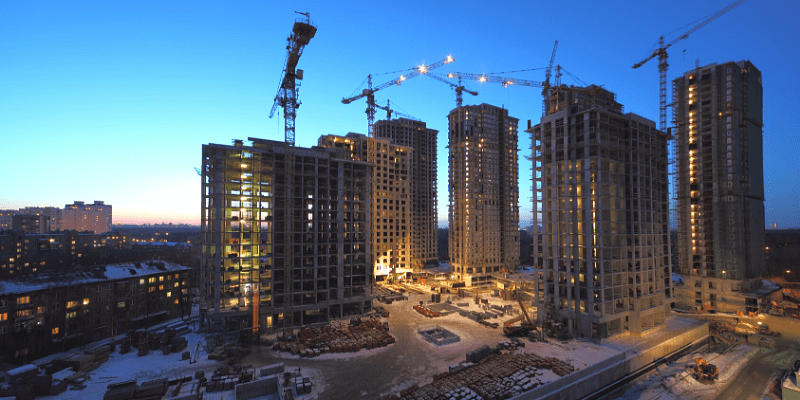A one-of-a-kind transition is taking place, as all of us tread our path from multiple lockdown extensions towards Unlock 1.0. Amid this crucial phase, realty also needs to adopt a new framework. Lockdown was imposed to save lives, now it is time we focus on saving our livelihood.

Real Estate offerings are in an advantageous position in terms being of an investment product. The property, once purchased, not only acts as a secure capital asset for the future, but also has great potential for price appreciation as the nearby area develops.
Commercial realty, as compared to the residential segment, has witnessed a booming growth over the past years due to the co-working culture, high-end retail, and an influx of entertainment spaces and industry. It may take a slight setback due to the popular Work from Home culture, however, it can never go out of demand due to the sheer recreational and organisational attributes attached to it.
What will the new framework have?
The new framework in realty will be largely dependent on digital presence, ease of virtual interaction and proceedings, secure payment gateways, and offers like never before. The interest of homebuyers and investors must be carefully assessed by the developers, before tapping on them. This framework will require the developer to be proactive when it comes to having a strong digital presence.
They must look for methods to establish themselves as a person who knows the nitty-gritty of business, and can deliver assurance to the customers without fail. This is necessary as buyers who have already invested are tensed about the deliveries, and the fence-sitters are not sure what will be the right project to put their money into.
Challenges in Unlock 1.0
Labour migration has been a daunting proposition to deal with for various developers who were not able to retain their labourers due to limited cash flow. Also, procuring of raw materials was difficult during the lockdown when the construction activities were permitted to resume operations with limited labour, coupled with adherence to social distancing and hygiene guidelines.
Discussion on price correction is doing rounds and developers have been asked several times to reduce their prices to initiate sales post COVID-19. The decision-makers have lent their full support with reduced repo rate, extended timelines and CLSS scheme, but asking the realtors to have a price-cut is simply not feasible.
The construction industry plays a vital role in maintaining the cash flow in the market due to its relation with so many allied industries.
The costs and regulations borne by the realtors before delivering the projects to homebuyers are multi-faceted and involve huge margins. Reducing prices uprightly cannot be the solution unless they get support from the government and banks in terms of loan restructuring, or perhaps a reduction in raw material prices.
Realtors can only expect the authorities to help them in clearing these stalled inventories, as growth in the realty sector will have a direct impact on the country’s economy and the current market conditions.
Ray of hope for Real Estate
With people being confined to their homes for such long periods, and health experts claiming that we must learn and unlearn things to survive with coronavirus, the new- normal has made everyone cautious about their lifestyle choices, question their financial planning, and seek for a safer and more advanced environment.
All these thought processes are going to directly translate into the home-buying pattern. Wellness homes, integrated townships, RTMI homes, and affordable housing units are emerging as some of the most popular choices. Buyers are keenly interested in sustainable and environmentally friendly living units.
These trends are apparent due to the spike in the number of enquiries that have been observed on the digital realty platforms. People with secured incomes are looking to invest in a second home that can yield them rental value, some are looking to switch from their traditional setting to a modern and much more conscious living in terms of cleaning and hygiene standards.
Reverse migration of NRIs and professionals from metros to Tier-II and Tier-III cities is also helping revive the demand for real estate projects.
Realty’s trajectory of growth
The sector has not seen a great spike in prices in the past seven-to-eight years, but the standstill due to COVID-19 has made the situation tricky.
Developers have to alter their business models, revisit their financial planning, be prepared for leading their workers as per the new guidelines, safeguard the health of the workers present at the site, and improvise upon labour shortage.
In the end, real estate acts as spokes in the wheel of the economy by playing a crucial role in providing spaces that take care of the businesses and citizens alike. Various segments of real estate will get back in a few months as the demand has increased multifold.
The best part is that real estate has always moved according to the requirements in the market and this dynamic nature provides the sector with necessary cushion in the long run.
(Edited by Kanishk Singh)
(Disclaimer: The views and opinions expressed in this article are those of the author and do not necessarily reflect the views of YourStory.)
Want to make your startup journey smooth? YS Education brings a comprehensive Funding and Startup Course. Learn from India's top investors and entrepreneurs. Click here to know more.
Link : https://yourstory.com/2020/06/unlock-one-holds-real-estate-sector
Author :- Kapil Kapur ( )
June 12, 2020 at 04:33PM
YourStory

